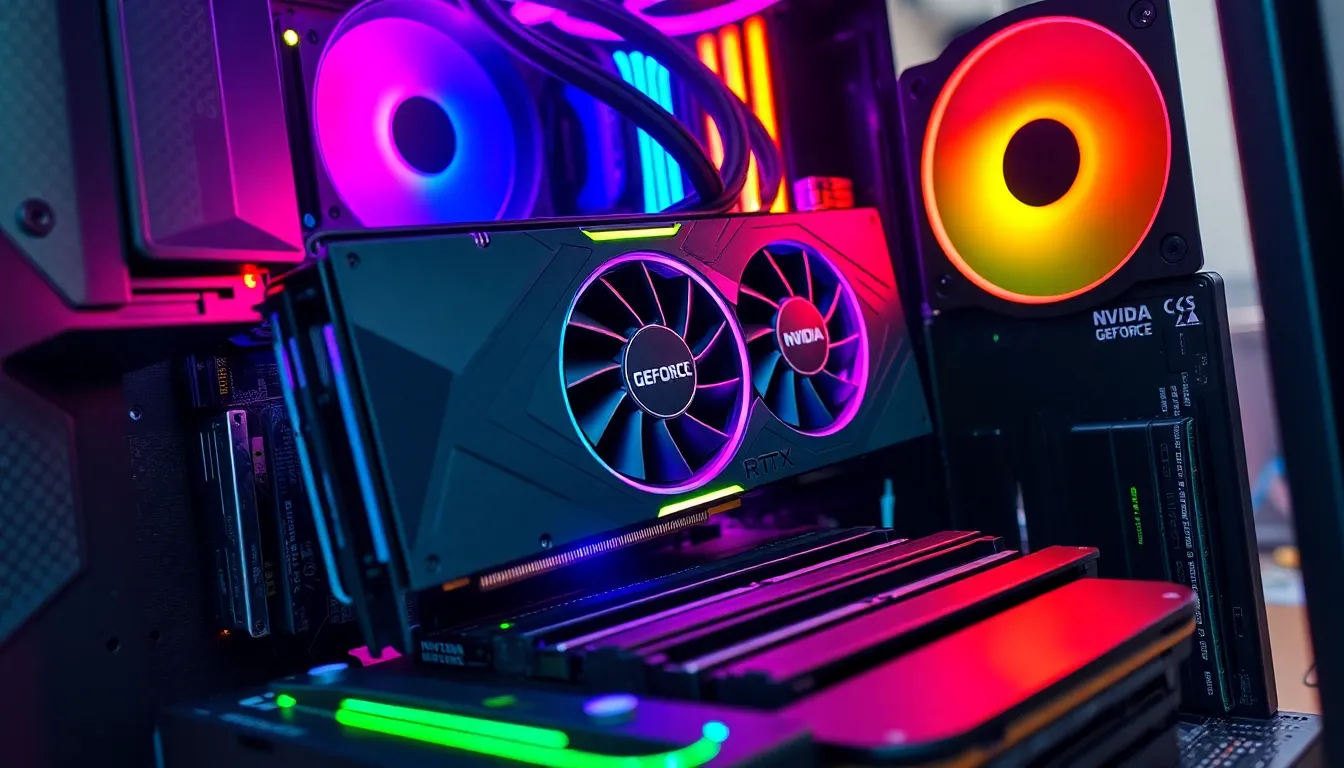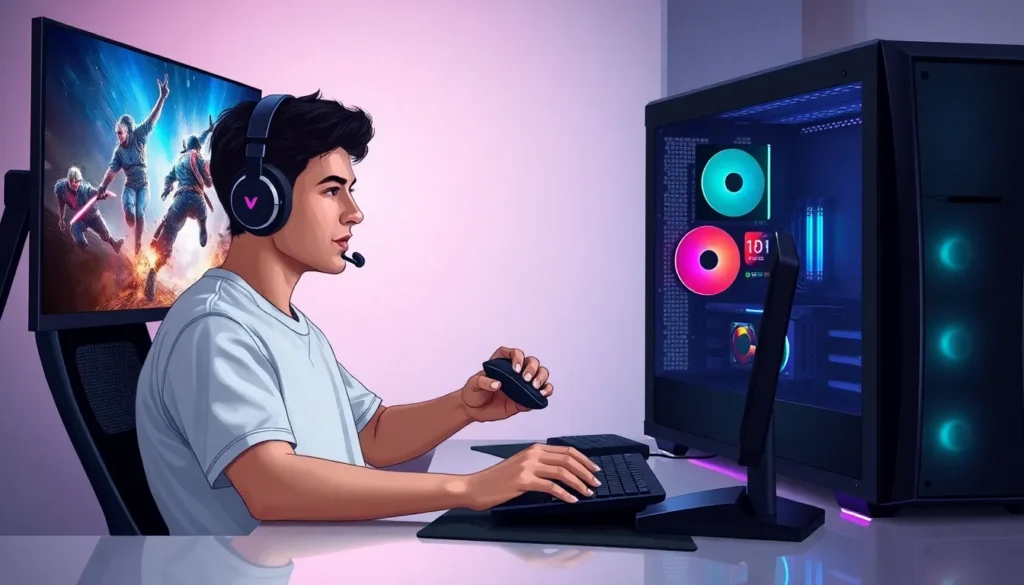Leveling up your gaming experience isn’t just about the latest graphics card or that fancy RGB keyboard. It’s about squeezing every drop of performance from your PC, turning it into a powerhouse that laughs in the face of lag and stutters. Imagine diving into your favorite game without the fear of frame drops or loading screens that feel like a trip to the DMV.
Understanding PC Optimization for Gaming
Achieving peak gaming performance involves more than hardware upgrades. Understanding system requirements plays a crucial role in delivering optimal experiences. Heeding game specifications helps identify necessary adjustments.
Enhancing operating system settings can significantly improve performance. Prioritizing game processes in the task manager reduces resource competition. Disabling unnecessary background applications frees up valuable memory and processing power.
Graphics settings in games can also impact performance. Lowering settings like texture quality or shadow detail often results in smoother gameplay. Adjusting resolution can also help find the right balance between visuals and frame rates.
Keeping drivers updated is essential for stability and performance. Graphics card manufacturers frequently release updates that optimize performance for new titles. Regularly checking for updates ensures access to the latest enhancements.
Cooling solutions should not be overlooked. Installing additional fans or upgrading the cooling system helps maintain optimal temperatures during intense gaming sessions. Maintaining proper airflow promotes longevity and consistent performance.
Storage choices affect load times and overall system speed. Utilizing Solid State Drives (SSDs) instead of traditional Hard Disk Drives (HDDs) reduces loading times significantly. Organizing game files and uninstalling unused applications can also help maximize storage efficiency.
Monitoring system performance using specialized software allows for real-time insights. This information aids in identifying bottlenecks and helps users make informed adjustments. Adjusting based on these metrics can greatly enhance the gaming experience.
Focusing on these optimization strategies enables smoother gameplay and minimizes interruptions, ultimately amplifying the gaming enjoyment.
Hardware Upgrades

Upgrading hardware plays a crucial role in enhancing gaming performance. Key components like the graphics card and RAM can significantly impact gameplay quality and speed.
Graphics Card Enhancements
Investing in a powerful graphics card often delivers noticeable performance boosts. A higher-end GPU improves image quality and enables higher resolutions and frame rates. Popular options include the NVIDIA GeForce RTX and AMD Radeon RX series. Selecting models with more VRAM typically enhances performance for modern games. Keeping the graphics drivers updated ensures optimal performance, as manufacturers release updates that improve game compatibility and performance. Overclocking the GPU can also provide additional enhancements, but users should monitor temperatures to avoid overheating.
RAM Improvements
Increasing RAM capacity is essential for smoother gaming experiences. Many games benefit from at least 16 GB of RAM, while more demanding titles may require 32 GB or more. Dual-channel configurations can further boost performance by enabling faster data access. Upgrading to faster RAM speed, such as DDR4-3200 or higher, maximizes the efficiency of the system. Optimizing memory settings in the BIOS may enhance performance as well. Reducing background processes improves available memory for gaming, leading to fewer interruptions and lag during gameplay.
Software Optimization Techniques
Optimizing software settings is crucial for enhancing gaming performance. Various techniques can significantly improve overall system efficiency.
Operating System Tweaks
Operating system tweaks play a vital role in optimizing gaming experiences. Disabling unnecessary startup programs releases valuable system resources. Adjusting power settings to high performance ensures the CPU runs at maximum capacity during gameplay. Turning off visual effects, such as animations, minimizes distractions and frees up processing power. Prioritizing game processes through the Task Manager allows the CPU to focus on running the game smoothly. Regularly updating the operating system covers security vulnerabilities and improves overall stability, which can enhance gaming performance.
Game-Specific Settings
Game-specific settings offer additional avenues for optimization. Lowering in-game graphics settings improves frame rates and reduces lag, especially on less powerful systems. Configuring resolution settings to match display capabilities balances visual fidelity and performance. Enabling full-screen mode often boosts frame rates compared to windowed mode. Fine-tuning detail levels for textures or shadows allows users to customize performance without sacrificing much visual quality. Many games include an optimization feature using system data to suggest the best settings, streamlining the adjustment process for users seeking enhanced performance.
Performance Monitoring Tools
Performance monitoring tools are essential for identifying optimization opportunities in gaming PCs. These tools provide crucial insights that help gamers improve their experience.
Benchmarking Software
Benchmarking software evaluates a system’s performance by testing graphics and processing capabilities. Tools like 3DMark and Cinebench measure performance across various scenarios, delivering scores that assist in comparisons. Users can select specific tests to analyze components, making it easier to spot bottlenecks. By understanding where performance lags, players can prioritize upgrades, ensuring better resource allocation. Comprehensive insights allow for informed decisions on graphics settings or hardware improvements tailored to individual gaming needs.
System Monitoring Applications
System monitoring applications offer real-time tracking of hardware metrics. Programs like MSI Afterburner and HWMonitor display critical data, including CPU usage, GPU temperature, and RAM consumption. Gamers benefit from monitoring system demands during gameplay, ensuring the hardware operates efficiently. Identifying performance dips or overheating situations helps in maintaining stable frame rates. Adjusting in-game settings based on monitored data enhances the overall experience, allowing for seamless gameplay without interruptions. These tools empower users to fine-tune their systems effectively.
Conclusion
Optimizing a PC for gaming is essential for achieving a top-notch experience. By focusing on both software and hardware enhancements gamers can eliminate lag and improve overall performance. Adjusting system settings and utilizing performance monitoring tools provide valuable insights to make informed decisions on upgrades.
Investing in high-quality components and keeping everything updated ensures a smoother gameplay experience. With the right strategies in place gamers can enjoy their favorite titles without interruptions, maximizing both enjoyment and competitiveness. Embracing these optimization techniques will not only enhance current gaming sessions but also prepare the system for future demands.

